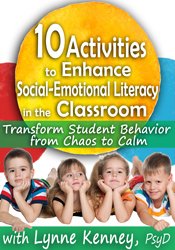
10 Activities to Enhance Social-Emotional Literacy in the Classroom: Transform Student Behavior from Chaos to Calm
Credit Available - See CEUs tab below.
- Faculty:
- Lynne Kenney, PsyD
- Duration:
- 1 Hour 44 Minutes
- Format:
- Audio and Video
- Original Program Date:
- 23 Aug, 2016
- SKU:
- POS051620
- Media Type:
- Online Learning
Description
Imagine a classroom that is calm, well-managed and centered on learning, not behavior management.
Join us for a practical program introducing research-based activities from Dr. Kenney’s most recent works Bloom Your Room and 70 Play Activities To Enhance Thinking, Self-Regulation, Learning and Behavior. Discover simple activities to enhance competence, confidence, communication and collaboration. Get ahead of misbehavior by teaching with the brain in mind!
CEUs
This course is available for 1.75 total CPDs.
The HPCSA has declared that any on-line courses CPD/CEU credited by a certified US board, is automatically CPD/CEU credited in South Africa.
As there are different boards for different disciplines, we at Acacia suggest that you use the Counselling CPD/CEU credits. These correspond to South African credits of one CPD/CEU per 60 minutes. If you choose to use your discipline's credits, please do so at your discretion.
PESI, Inc. is an approved provider with the Florida Board of Clinical Social Work, Marriage and Family Therapy and Mental Health Counseling. Provider Number 50-399. This self-study course qualifies for 1.5 continuing education credits.
Handouts
| File type | File name | Number of pages | |
|---|---|---|---|
| 10 Activities to Enhance Social-Emotional Literacy in the Classroom: Transform Student Behavior from Chaos to Calm (0.99 MB) | Available after Purchase |
Faculty

Lynne Kenney, PsyD Related seminars and products
Move2Think, LLC
Dr. Lynne Kenney is the nation’s leading pediatric psychologist in the development of classroom cognitive-physical activity programs for students grades K-8. She develops curriculum, programming, and activities to improve children’s cognition through coordinative cognitive-motor movement, executive function skill building strategies, and social-emotional learning. Her current educational program is CogniMoves®, a classroom cognitive-motor movement program, co-developed with Benjamin S. Bunney, MD, Former Chairman Department of Psychiatry at Yale University. CogniMoves® is designed to strengthen executive function skills in K-3 students.
Dr. Kenney is a pediatric psychologist on the language & cognition team at Wellington-Alexander Center for the Treatment of Dyslexia, Scottsdale, Arizona. She has advanced fellowship training in forensic psychology and developmental pediatric psychology from Massachusetts General Hospital/Harvard Medical School and Harbor-UCLA/UCLA Medical School. As an international educator, researcher, and author, she is dedicated to improving the trajectory of children’s learning, particularly in high-need, under-resourced communities. Dr. Kenney’s books include Brain Primers, 2020 (Kuczala & Kenney); 70 Play Activities for Better thinking, Self-Regulation, Learning and Behavior (Kenney & Comizio, 2016); the Social-Emotional Literacy program, Bloom Your Room™; Musical Thinking™, and Bloom: 50 Things To Say, Think and Do with Anxious, Angry and Over-the-Top Kids (Kenney & Young, 2015). Her most recent endeavor is Cognitivities™, an original collection of portable mats that combine music, art, and movement developed with Fit and Fun Playscapes. Launched in 2024, this is the first Roll-Out Activities® mat of its kind, helping children with cognitive skills, executive function, and self-regulation in a calming and engaging way. In development, FlowMoves™ cognitive-motor movement cards for high-need communities and families to support co-regulation and self-regulation.
Since 1985, Dr. Kenney has worked as an educator in community services with national organizations including the Neurological Health Foundation, Head Start, Understood.org, HandsOn Phoenix, SparkPE, the First Nations in Canada, and Points of Light (Generation On). Dr. Kenney values working with Title I Schools.
Speaker Disclosures:
Financial: Dr. Lynne Kenney is the creator of CogniSuite & The Kinetic Classroom and the co-creator of 5n45. She is the co-owner of Move2Learn, LLC and has an employment relationship with Wellington-Alexander Center for the Treatment of Dyslexia and receives compensation as a consultant. Dr. Kenney receives royalties as a published author. She receives a speaking honorarium and recording royalties from PESI, Inc. She has no relevant financial relationships with ineligible organizations.
Non-financial: Dr. Lynne Kenney is Play Math Ambassador.
Target Audience
Psychologists, Social Workers, Addiction Counselors, Counselors, Marriage & Family Therapists, Speech Language Pathologists, Educators, Occupational Therapists & Occupational Therapy Assistants and other Mental Health ProfessionalsObjectives
- Establish a new social-emotional literacy tool for classrooms called Bloom Your Room, created as a 50-piece art collection with research-based strategies, tools and activities build into it. Kids will enjoy the art, talking about the characters and learning social skills, kindness and empathy without any resistance.
- Show how to fill your tool-box with words and activities to help your students on a healthy path to good behavior and top-notch learning.
- Describe exactly what to say to encourage students to be prosocial, kind and caring with one another, allowing you more time to do what you love, teach.
Outline
- Learning Objectives
- Cognitive Science behind learning and memory
- Cognitive Detective
- Cognitive Conversations
- Tool-box
- 10 Thinking Skill Activities
- The Love Notes from Musical Thinking
- Slow Mo and Quick Rick
- Why We Move To Think
- Let Me Think About That
- What’s In It For Me
- The “Cognitive Conversation”
- My Attention Engine
- Process Speed Front Loading Worksheet
- The HOPPER Homework Planning Sheet
- Put A Bow On It
- Core Executive Functions
- Attention
- Planning and Previewing
- Approaching Tasks
- Initiation and Execution
- Reviewing and Revising
- Organization
- Memory
- Inhibition
- Time estimation, allocation, monitoring
- How We Learn
- What learning is
- How we learn
- Memory
- Neuronal Pathways
- Practice
- Movement
- Rhythm, tempo and timing
- Activities
Please wait ...
